Holocaust Living History Workshop: Events
2024 - 2025
Violence, Voice, and Recognition, 2024-25
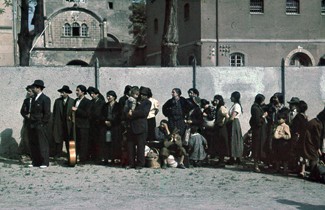
2024 marks the 80th anniversary of the massive deportations from Hungary to Auschwitz that resulted in the violent death of around 440,000 Jews. The men, women, and children herded into the gas chambers of Birkenau have left little behind beyond the evidence of their ghastly death. While our understanding of the so-called Final Solution has advanced immeasurably over the decades, important gaps in our knowledge remain. What went through people’s heads as they walked along the ramp of Birkenau? What did it mean to be a victim of the massacre at the Babyn Yar ravine outside of Kiyv? How did perpetrators exploit sex as a means of oppression and persecution? What were the historical circumstances in which radical antisemitism was first articulated and allowed to flourish? And how have the Roma, the only other racialized group besides the Jews to be singled out for wholesale extermination, both experienced and remembered the Holocaust? The voices of survivors and their descendants inarguably constitute a major source of insight into, and an answer of sorts, to these and other pressing questions that scholars and philosophers continue to grapple with. This year’s season of public events reminds us that although a complete grasp of the Holocaust and the extreme violence it wrought may always elude us, we have a better chance at understanding its essence if we listen to the victims’ voices as they continue to cry out for recognition.
View the full list of Holocaust Living History Workshop Events for 2024-2025. All events start at 5:00 p.m. and are free and open to the public, but registration is required.
Past Events
Recorded events are available via:
2023 - 2024 Events
2023 - 2024
Spaces of Persecution
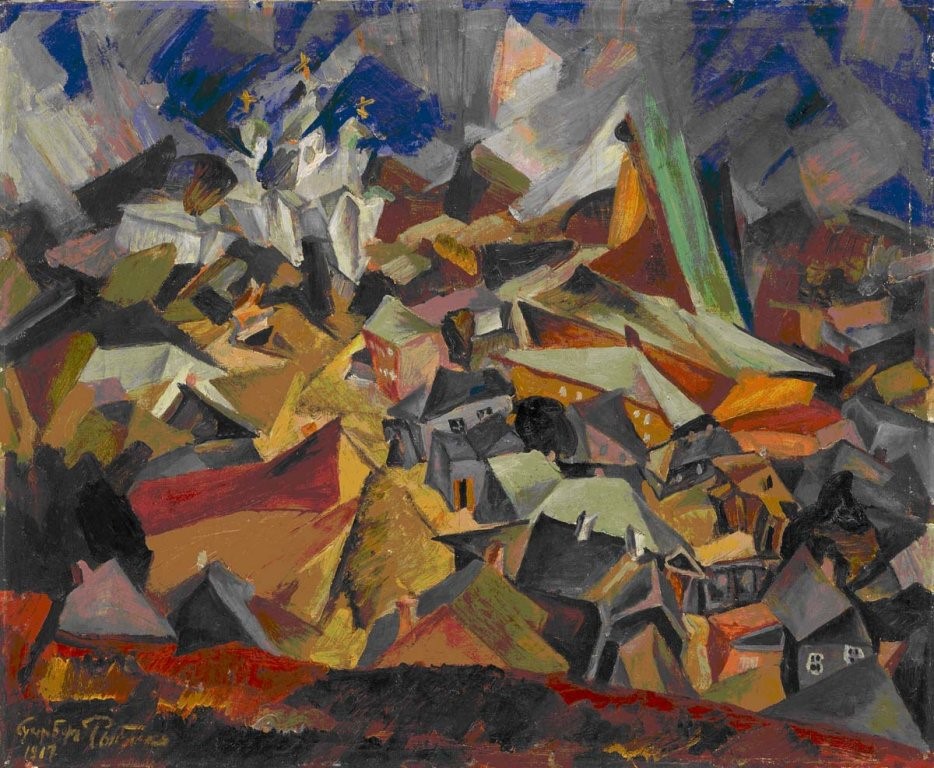
It may be too self-evident to state: the Nazi persecution of the Jews took place in space as well as in time. For roughly half a century historians have focused primarily on time, i.e. the chronology of discrimination and death. This focus on change and causality, while undeniably valuable, has distracted us for too long from the centrality of space in the experience of persecution. Victims were tormented in manifold and extremely varied spaces, ranging from family homes and barns to town squares and open fields. There were also the metaphorical spaces of the law or antisemitic propaganda such as pamphlets and posters. All of these conspired to create a climate of fear that was difficult to endure. Put another way, for the victims, space was central, and survivors’ memories are inevitably anchored in the specific spaces of their unique experience. As Michel de Certeau asserts, ultimately all stories are spatial stories. In keeping with this theme, this year’s series of public events encourages attendees to reflect on the centrality of space in the Holocaust.
View the full list of Holocaust Living History Workshop Events for 2023-2024. All events start at 5:00 p.m. and are free and open to the public, but registration is required.
2022 - 2023 Events
Spaces of Persecution

It may be too self-evident to state: the Nazi persecution of the Jews took place in space as well as in time. For roughly half a century historians have focused primarily on time, i.e. the chronology of discrimination and death. This focus on change and causality, while undeniably valuable, has distracted us for too long from the centrality of space in the experience of persecution. Victims were tormented in manifold and extremely varied spaces, ranging from family homes and barns to town squares and open fields. There were also the metaphorical spaces of the law or antisemitic propaganda such as pamphlets and posters. All of these conspired to create a climate of fear that was difficult to endure. Put another way, for the victims, space was central, and survivors’ memories are inevitably anchored in the specific spaces of their unique experience. As Michel de Certeau asserts, ultimately all stories are spatial stories. In keeping with this theme, this year’s series of public events encourages attendees to reflect on the centrality of space in the Holocaust.
View the full list of Holocaust Living History Workshop Events for 2023-2024. All events start at 5:00 p.m. and are free and open to the public, but registration is required.
2021 - 2022 Events
Rethinking Genocide: Fascism, Exploitation, and the Holocaust
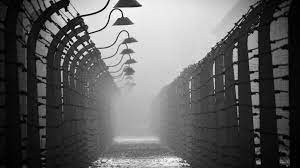
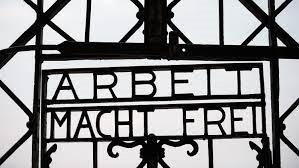
Among the iconic images of the Holocaust the ubiquitous sign “Arbeit macht frei” (work makes you free) is easily among the most recognizable. Erected at the entrance of major concentration camps like Dachau, Sachsenhausen, and Auschwitz, the sign constituted a cruel taunt to prisoners who had little hope of ever being set free. The sign poses a puzzle to anyone who ponders the role of forced labor in Nazi Germany and its occupied territories. How did the exploitation of men, women, and children in countless camps across Europe and North Africa fit into National Socialist ideology? What was the role of fascism in this ideology? And how did the victorious allies punish the Nazis for imprisoning and enslaving hundreds of thousands of people? All too often these questions are sidelined by the understandable focus on mass murder. Despite major advances in Holocaust historiography over the last several decades, however, scholars still grapple with these issues. This year’s series of public events explores the topic of labor and exploitation from various angles. At the core of the series stands the enigma of how individuals can be made to oppress, imprison, and exploit their fellow human beings.
View the full list of Holocaust Living History Workshop Events for 2022-2023. All events start at 5:00 p.m. and are free and open to the public, but registration is required.
2020 - 2021 Events
Beyond the Great Silence: The Holocaust in Art, Memory, and Life
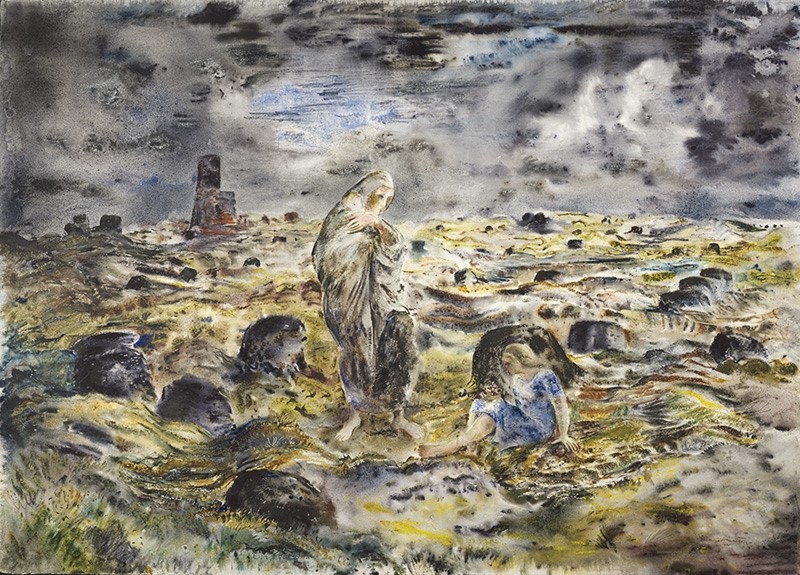
In 2020 the world commemorated the 75th anniversary of the liberation of Auschwitz and the end of the Second World War. Back in 1945, facing unprecedented destruction and dislocation, few Europeans were ready to confront the horrors Nazi Germany and its collaborators had inflicted on their victims. As a result, Holocaust survivors faced what the Israeli historian Tom Segev has called the “great silence.” No one was interested in hearing about their experience. Three quarters of a century later, the situation has changed dramatically. In the United States, Germany, and Israel Holocaust Studies are thriving. The Shoah has spawned countless major motion pictures and television series that have shaped the public’s understanding of the genocide. Yet there are still aspects of the catastrophe that continue to be unearthed, grappled with, and shared. This year’s series of public events focuses on individual as well as group responses to the Holocaust and its long aftermath. The innovative approaches employed by featured Holocaust Living History Workshop presenters demonstrates an incontrovertible fact: despite being subjected to scrutiny for decades, the Holocaust continues to engage artists and writers, scholars, and survivors.<
View the full list of Holocaust Living History Workshop events for 2020 - 2021.
2019 - 2020 Events
Facing the Shoah: Trauma, Memory, Resilience
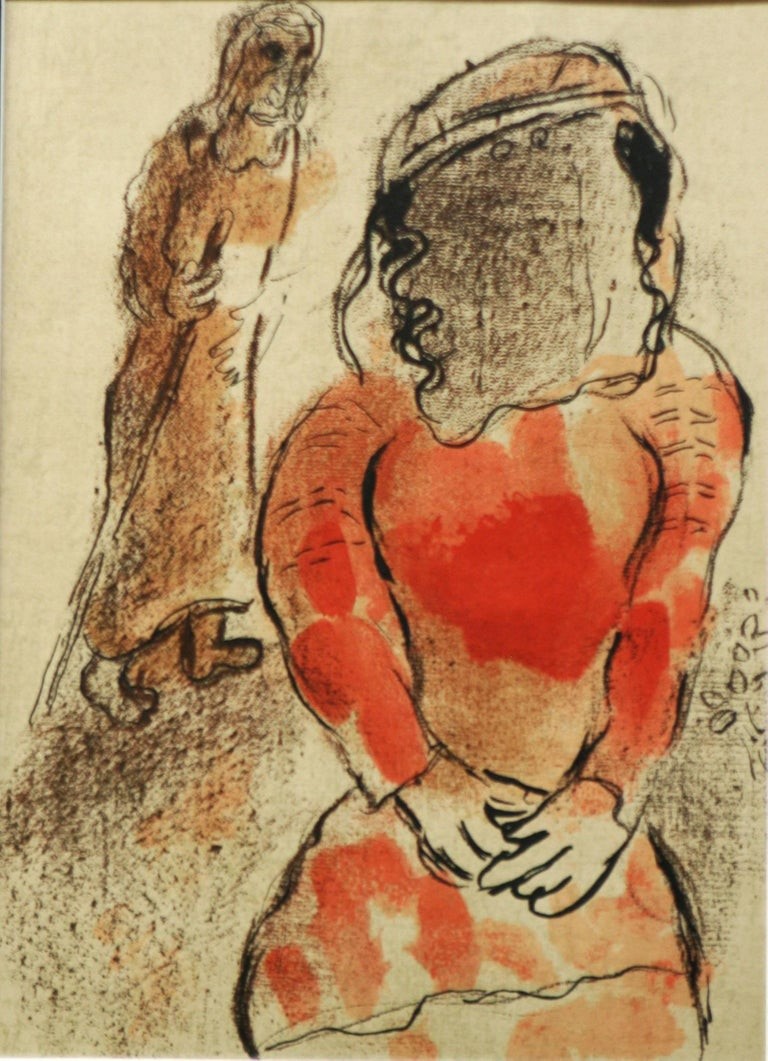
In a culture increasingly condensed to sound-bites, even as immense and complex a catastrophe as the Holocaust is frequently reduced to a few key terms. Hitler, Auschwitz, gas chambers: these are the code words that conjure the mass murder of six million Jews and millions of other victims during the Second World War. The Shoah, however, cannot be understood by looking merely at the actions of a few powerful men operating in a handful of strategic locations. A comprehensive study needs to encompass prelude, occurrence, and aftermath of the genocide. Above all, it needs to approach the targets of the Nazi exterminatory policy in terms of their unique individuality. To illuminate neglected aspects of the Holocaust, this year's series of public events focused on the themes of trauma, memory, and resilience. How have societies and individuals dealt with trauma? How is tragedy remembered, mediated, and transmitted? And finally, in what ways have victims and survivors managed to transform suffering and loss into art? The 2019 - 2020 Holocaust Living History Workshop series, in keeping with the program's name, presented a genuinely "living history" intended to emphasize the reverberations of the Shoah in the present. This focus on "living" rather than dead history acknowledges the multifarious nature of victimization and survival and, in so doing, restores the faces to the faceless Others.
View the full list of Holocaust Living History Workshop events for 2019 - 2020.
2018 - 2019 Events
The Holocaust: History, Memory, and Meaning
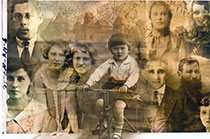
History writing in the West tends to be structured in terms of causation, contingency, and chronology. What if we were to conceive of history in terms of a palimpsest instead – as layers of meaning that are constantly being written, erased, and rewritten? Unlike historians, men and women who have experienced historical tragedies cannot simply declare history to be finished. This is nowhere more true than when applied to the Holocaust. As the Nazi past becomes historicized, memories of the great offense linger over time, like sediment building up in the individual and collective consciousness. It is from this sediment that meaning is derived. In this year’s lecture series, speakers explore the elusive connection between history, memory of the past, and meaning in the present. Whether the topic is a photographer’s journey to the Lithuanian killing fields, individual acts of resistance against Nazi oppression in the Third Reich, or the experience of a Yugoslav child survivor, memory and meaning provide the signposts in their attempts to make sense of the past.
View the full list of Holocaust Living History Workshop events for 2018 - 2019.
2017 - 2018 Events
The Possibility of Renewal: The Shoah Between Past, Present, and Future
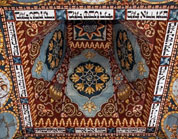
In 1640 the people of Gwozdziec in the Polish-Lithuanian Commonwealth built a large wooden synagogue. Almost exactly three hundred years later, the German invaders burnt it to the ground. Another 73 years would pass until the synagogue would come to life once more. In 2014, the POLIN museum in Warsaw unveiled the synagogue’s reconstructed roof, complete with the stunningly replicated “celestial canopy.” The canopy symbolizes the bold attempt to reclaim an effaced history and to restore a lost heritage to its former vibrancy. What does it mean for a defeated people to resurrect its past? How is renewal possible in the wake of genocide? What role do memory and justice play in renewal? While the massive destruction wrought by the Holocaust cannot be diminished, much less ignored, the attempt to move beyond catastrophe and to rebuild life and culture deserves recognition as well. In this year’s series of public workshops, memory, justice, and renewal constitute the red threads that run through the tapestry of a history that is tragic yet also inspiring.
View the full list of Holocaust Living History Workshop events for 2017 - 2018.
2016 - 2017 Events
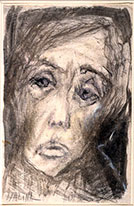
Ever since the last concentration camp prisoner was liberated in the spring of 1945, historians have struggled to make sense of the Holocaust. Initially ignored, the mass murder of European Jewry was first analyzed in-depth by Raul Hilberg, the doyen of Holocaust historiography. At the time of the publication of his magnum opus "The Destruction of European Jews" (1961), few could have predicted the enormous growth in scholarship that would be devoted to this most elusive of modern tragedies. Countless writers continue to grapple with the origins, scope, and aftermath of the genocide that diminished the Jewish population of Europe by two thirds and resulted in massive loss of non-Jewish life. Despite this tremendous increase in knowledge, however, we do not seem to be any nearer to understanding what really happened. Like the woman in Halina Olomucki’s haunting “Portrait of a Woman,” we are both grieved and baffled in the face of virtually unimaginable brutality and barbarity.
This year’s lecture series was structured around the theme of the burden of this history. Approaching the Holocaust from various angles, the workshops aimed to throw light on various aspects of the Holocaust such as recovering lost stories, documenting atrocity, and the transgenerational transmission of trauma.
View the full list of Holocaust Living History Workshop events for 2016 - 2017.
2015 - 2016 Events
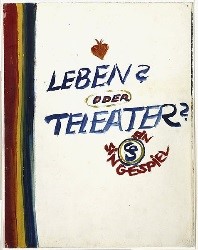
This year’s series contained presentations by scholars, writers, filmmakers, and survivors that highlighted the trope of the journey. The geography of these “Holocaust journeys” extends from Poland in the East to Ecuador in the West, while the form of expression ranges from literature and art to documentary and scholarly research. The result is a rich tapestry of experiential trajectories that illustrates the complex nature of the Shoah.
The title page of the Jewish artist Charlotte Salomon's (1917-1943) principal work "Life? or Theatre?" located in the Joods Historisch Museum in Amsterdam. The story of Charlotte Salomon and her works was presented by Darcy Buerkle.
View the full list of Holocaust Living History Workshop events for 2015 - 2016.
2014 - 2015 Events
Hidden Stories: Legacy of Pain
This year's lecture series was dedicated to the topic of "hidden stories." From the memories of Ruth Hohberg, a child survivor from Bielsko, to the archives of missing persons assembled by the International Red Cross, the Holocaust was a calamity of such massive proportions that we are still discovering and recovering new information. Holocaust survivor Lou Dunst was present during the world-premiere of the documentary "I Had to Clean My Heart," a film dedicated to his life. He passed away in September 2015.
View the full list of Holocaust Living History Workshop events for 2014 - 2015.
2013 - 2014 Events
Journeys, Memories, Echoes
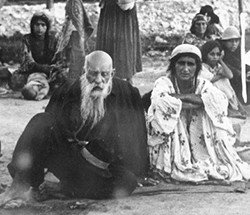
Although the Holocaust officially ended with the conclusion of the Second World War in 1945, it is neither past nor "masterable," to borrow from the historian Charles Maier. In this series, survivors and scholars explored the journeys they have taken, both personally and professionally, and the insights they gained.
A Roma man and woman sit in an open area of the Belzec death camp. The Roma were the only people besides the Jews that was targeted for complete extermination.
View the full list of Holocaust Living History Workshop events for 2013 - 2014.
2012 - 2013 Events
The Long Shadow of the Past

This year's workshops constituted a tapestry of unique tales: from the experience of child survivors and the attempts of second-generation survivors to reconstruct their family's past to scholarly attempts to trace vanished communities – all these stories form an important chapter in the recent Jewish past. The synagogue of Tunis.
View the full list of Holocaust Living History Workshop events for 2012 - 2013.
2011 - 2012 Events
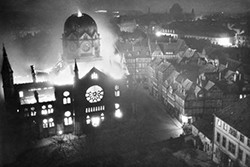
Witnessing History
What does it mean to witness history in the making? During this academic year, the Holocaust Living History Workshop provided the broader San Diego community with an opportunity to learn more about this experience and to contemplate the painful reverberations of events that took place more than half a century ago. On the night of November 9, 1938, subsequently called Kristallnacht, the Nazis unleashed a nationwide pogrom that was intended to drive the Jews out of Germany. Synagogues all over the country were set on fire.
View the full list of Holocaust Living History Workshop events for 2011 - 2012.
2010 - 2011 Events
View the full list of Holocaust Living History Workshop events for 2010 - 2011.